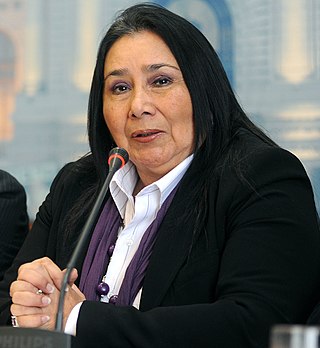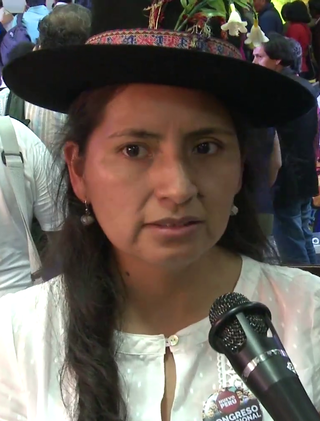Related Research Articles

Martha Beatriz Merino Lucero is a Peruvian lawyer,academic and politician who served as the first female Prime Minister of Peru,in 2003. She previously served as Senator and Congresswoman from 1990 until 2000. Following her tenure in Alejandro Toledo's cabinet,Merino was appointed by the Peruvian Congress as the national ombudswoman for Peru,serving from 2005 to 2011,a position officially known as the Public Defender,being the second to hold the position.

Lourdes Celmira Rosario Flores Nano is a Peruvian lawyer and politician who served as a councilwoman of Lima,Deputy from Lima from 1990 to 1992,Democratic Constituent Congresswoman from 1992 to 1995,Congresswoman from 1995 to 2000,and the Christian People's Party candidate for President of Peru in the 2001 and 2006 elections in which she ran under the National Unity.

María del Pilar Nores Bodereau de García is an Argentine-born Peruvian economist and the widow of former President of Peru Alan García,she was that nation's First Lady on two occasions.

General elections were held in Peru on 17 June 1956 to elect the President and both houses of the Congress. Manuel Prado Ugarteche of the Pradist Democratic Movement won the presidential election with 45.5% of the vote. They were the first elections in Peru in which women could vote,and nine women were elected to Congress;Manuela Billinghurst,Alicia Blanco Montesinos,Lola Blanco Montesinos,María Colina Lozano,Matilde Pérez Palacio,Carlota Ramos de Santolaya,María Eleonora Silva Silva and Juana Ubilluz de Palacios were elected to the Chamber of Deputies,while Irene Silva de Santolalla became the first woman elected to the Senate.
Olga Núñez Abaunza was the first female Nicaraguan lawyer and first female notary. She was the first woman to serve in a Ministerial capacity and the First woman Deputy to serve in the National Assembly of Nicaragua. She was an ardent feminist,attending feminist conferences,forming a feminine wing of the liberal party,and running for office on a feminist platform.

Ángela Acuña Braun,also known as Ángela Acuña de Chacón,,a Costa Rican lawyer,women's rights pioneer and ambassador,was the first woman to graduate as a lawyer in Central America. Orphaned at the age of 12,she was raised by her maternal aunt and uncle,attending elementary school and beginning high school in Costa Rica. She continued her education in France and England,gaining exposure to the ideas of women's rights. Returning to Costa Rica in 1912,she published articles in support of women's equality. She attended the boys' lyceum or high school where she passed the bachillerato,a prerequisite for entering law school. She embarked on law studies in 1913,leading to a bachelor's degree in 1916. As women were barred from entering the profession,Acuña immediately presented a reform to the civil code allowing this,which was adopted.

Luz Filomena Salgado Rubianes de Paredes is a Peruvian Fujimorist politician and journalist who served as President of the Congress thrice,from 2016 to 2017 as a full-term and twice briefly in 2000 in an acting capacity.

Trinidad María Enríquez was a Peruvian teacher and student. After completing the only education available to her,she founded a school to teach other girls and complete the necessary requirements to enter university. Appealing to the president,she was granted the right to attend if an examination proved she was adequately prepared. Passing her review,Enríquez completed courses at the National University of Saint Anthony the Abbot in Cuzco,becoming the first Peruvian woman to earn a university degree in 1878. Though she graduated,she was denied a license to practice law and fought her case through the legislature and court systems until her death in 1891.

Aída del Carmen Jesús Consuelo García-Naranjo Morales,also known by her nickname "Mocha",is a Peruvian educator,singer,and politician,the former Secretary General of the Socialist Party and spokesperson of Gana Perú,the alliance of former President Ollanta Humala.
Women in PSOE in Francoist Spain had been involved in important socialist activism since the 1930s,including behind the scenes during the Asturian miners' strike of 1934,even as the party offered few leadership roles to women and address the issues of women. During the Civil War,the party was one of the few left wing actors to reject the idea of women on the front,believing women instead should take care of the home.
Women in Unión General de Trabajadores (UGT) in Francoist Spain played important roles in the union dating back to the Second Republic period,even as their specific needs like maternity leave,childcare provisions and equal pay were subverted for the improvement of better overall working conditions. Women UGT leaders in the Civil War period included María Lacrampe and Claudina García Perez.

Tania Pariona Tarqui is a Quechua leader,social worker,politician and human rights activist who represented the Department of Ayacucho in the Congress of the Republic of Peru. As an activist,she works largely to establish social equality for the Indigenous,youth and women. In 2016,she was elected to the Peruvian Congress by the Broad Front for Justice,Life and Freedom. In September 2017,she joined the New Peru bloc. On 15 August 2018,she became president of the Women and Family Commission of the Congress.
Alma Rosa Castañeda de Mora was a Guatemalan social activist and politician. She was elected to Congress in 1955,becoming its first female member.
Manuela Candelaria Billinghurst López was a Peruvian politician. In 1956 she was among the first group of women elected to Congress,serving until 1962.
Lola Blanco Montesinos de La Rosa Sánchez was a Peruvian educator and politician. In 1956 she was among the first group of women elected to Congress,serving until 1962.
María Mercedes Colina Lozano de Gotuzzo was a Peruvian politician. In 1956 she was among the first group of women elected to Congress,serving until 1962,and again between 1963 and 1968.
Matilde Pérez Palacio Carranza was a Peruvian educator,journalist and politician. In 1956 she was among the first group of women elected to Congress,serving until 1962,and again between 1963 and 1968.
Carlota Ramos de Santolaya (1910–1994) was a Peruvian poet and politician. In 1956 she was among the first group of women elected to Congress,serving until 1962.
María Eleonora Silva y Silva was a Peruvian politician. In 1956 she was among the first group of women elected to Congress,serving until 1962.
Juana Magdalena Ubilluz de Palacios was a Peruvian educator and politician. In 1956 she was among the first group of women elected to Congress,serving until 1962.
References
- 1 2 3 4 5 6 7 Primeras Mujeres Parlamentarias 1956-1962 Congress of Peru
- ↑ Mujeres precursoras: conoce quiénes fueron las primeras congresistas peruanas El Comercio, 30 January 2020